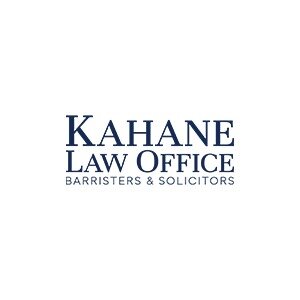Best Art & Cultural Property Law Lawyers in Edmonton
Share your needs with us, get contacted by law firms.
Free. Takes 2 min.
List of the best lawyers in Edmonton, Canada
About Art & Cultural Property Law in Edmonton, Canada
Art & Cultural Property Law in Edmonton encompasses a range of legal issues related to the creation, distribution, and protection of art and cultural artifacts. This specialized field addresses matters such as intellectual property rights, the provenance of art, cultural heritage preservation, and the illegal trade of cultural objects. The legal framework in Canada is designed to protect cultural heritage while facilitating the growth and exchange of art within both domestic and international spheres.
Why You May Need a Lawyer
Individuals or organizations may need legal assistance in Art & Cultural Property Law for several reasons, including:
- Protecting intellectual property rights for artists and creators.
- Facilitating the safe and lawful acquisition or transfer of art pieces.
- Navigating disputes over ownership or authenticity of cultural property.
- Ensuring compliance with local, provincial, and international regulations regarding art and cultural heritage.
- Advising on the implications of loans or donations of art to public institutions.
- Addressing illegal export or import of cultural artifacts.
Local Laws Overview
Edmonton, as part of Alberta, adheres to both federal and provincial laws related to art and cultural property. Key aspects include:
- Intellectual Property Law: Covers copyrights, trademarks, and patents which protect the rights of artists and creators.
- Cultural Property Export and Import Act: Governs the export and import of cultural property to prevent illegal trafficking of artifacts.
- Alberta Heritage Act: Provides regulations for preserving cultural heritage sites and artifacts within the province.
- Museums Act: Relates to the management and administration of public art collections in Canadian museums.
Frequently Asked Questions
What is cultural property?
Cultural property refers to items that hold significance for archaeology, prehistory, history, literature, art, or science. This includes artifacts, artworks, and historical sites.
How can I determine the authenticity of an artwork?
Determining authenticity usually requires consulting a specialist who can assess the artwork's provenance, materials, and historical documentation. Legal assistance may be required if disputes arise.
What are intellectual property rights in art?
Intellectual property rights in art typically cover copyrights, which protect the creator's original work from unauthorized use.
What should I do if I inherit art or artifacts?
If you inherit art or artifacts, it's wise to consult a lawyer to understand your rights and any legal obligations regarding valuation, tax, or potential claims on the pieces.
How is the value of art determined in legal settings?
The value of art in legal settings is often determined by professional appraisers who consider market demand, provenance, and the condition of the piece.
What are the consequences of illegally exporting cultural property from Canada?
Illegal exportation of cultural property from Canada can lead to severe penalties, including fines and imprisonment, as well as the seizure of the artifacts in question.
Can digital art be copyrighted?
Yes, digital art can be copyrighted, providing the creator with protection against unauthorized use or reproduction of their work.
What steps should I take to legally sell a piece of cultural property?
To sell cultural property legally, ensure clear ownership documentation, provenance verification, and compliance with relevant export regulations and taxes.
How can museums acquire art legally?
Museums need to conduct thorough due diligence to verify the provenance of items, ensure legal acquisition, and comply with national and international laws.
What role do heritage organizations play in cultural property law?
Heritage organizations work to preserve and promote cultural property through advocacy, education, and legal routes, ensuring compliance with preservation laws and supporting cultural heritage initiatives.
Additional Resources
Consider consulting the following resources for further guidance on Art & Cultural Property Law:
- Canadian Artists' Representation: Provides advocacy and legal resources for Canadian artists.
- Canadian Intellectual Property Office: Offers information on protecting intellectual property rights.
- Alberta Museums Association: Supports the preservation and management of Alberta's cultural heritage.
- Government of Canada Cultural Property Export and Import: Provides regulations and guidance on the legal trade of cultural property.
Next Steps
If you require legal assistance in Art & Cultural Property Law, consider the following steps:
- Identify the specific legal issue you are facing and gather relevant documentation.
- Research and contact lawyers in Edmonton who specialize in Art & Cultural Property Law.
- Schedule consultations to discuss your situation and explore potential legal solutions.
- Consider alternative dispute resolution methods, if appropriate, to resolve issues outside the courtroom.
- Stay informed about updates to relevant laws and regulations that may affect your case.
Lawzana helps you find the best lawyers and law firms in Edmonton through a curated and pre-screened list of qualified legal professionals. Our platform offers rankings and detailed profiles of attorneys and law firms, allowing you to compare based on practice areas, including Art & Cultural Property Law, experience, and client feedback.
Each profile includes a description of the firm's areas of practice, client reviews, team members and partners, year of establishment, spoken languages, office locations, contact information, social media presence, and any published articles or resources. Most firms on our platform speak English and are experienced in both local and international legal matters.
Get a quote from top-rated law firms in Edmonton, Canada — quickly, securely, and without unnecessary hassle.
Disclaimer:
The information provided on this page is for general informational purposes only and does not constitute legal advice. While we strive to ensure the accuracy and relevance of the content, legal information may change over time, and interpretations of the law can vary. You should always consult with a qualified legal professional for advice specific to your situation.
We disclaim all liability for actions taken or not taken based on the content of this page. If you believe any information is incorrect or outdated, please contact us, and we will review and update it where appropriate.









